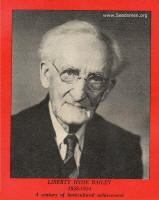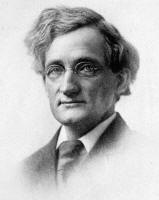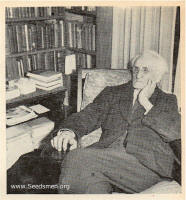|
Liberty Hyde Bailey,
Jr.
"Horticulture's Grand Old
Man"
 To
one of the first frontier pioneer families of Michigan, living at South
Haven, along the eastern shore of the lake, on March 15, 1858, was born a
son, Liberty Hyde Bailey, Jr. On Christmas night (1954) at Ithaca, New
York, surrounded by the throbbing of the university which he helped to
make great, with thousands of plants in his nearby Bailey Hortorium, and
amid the kindly thoughts, warm friendships, and deep affections that sped
towards him from all corners of the world, this lad — now one of the
world's great — died at the age of 96 years and nine months. To
one of the first frontier pioneer families of Michigan, living at South
Haven, along the eastern shore of the lake, on March 15, 1858, was born a
son, Liberty Hyde Bailey, Jr. On Christmas night (1954) at Ithaca, New
York, surrounded by the throbbing of the university which he helped to
make great, with thousands of plants in his nearby Bailey Hortorium, and
amid the kindly thoughts, warm friendships, and deep affections that sped
towards him from all corners of the world, this lad — now one of the
world's great — died at the age of 96 years and nine months.
His father, Liberty Hyde
Bailey, Sr., had come from Vermont as a young man, about 1840, settling 40
miles to the west on a tract of land at South Haven, on Lake Michigan. He
was a charter member of the still flourishing South Haven-Casco
Pomological Society. He planted orchards which thrice received awards in
their class in the state of Michigan. Amid trees, and birds, and all
nature, Liberty Hyde Bailey, Jr. grew up.
 It
was natural that young Bailey should find his way in 1877 to Michigan
Agricultural College at East Lansing, the first agricultural college in
the country, which this year celebrates its 100th anniversary. From here
he graduated in 1882. A few years with America's greatest botanist, Asa
Gray of Harvard, and back to Michigan Agricultural College he came in 1885
as professor of horticulture and landscape gardening, the first to hold
such a chair. Here he launched a "new horticulture" in which he envisioned
dynamic, earth-loving, plant-loving, laboratory and overall-clad work with
plants. It
was natural that young Bailey should find his way in 1877 to Michigan
Agricultural College at East Lansing, the first agricultural college in
the country, which this year celebrates its 100th anniversary. From here
he graduated in 1882. A few years with America's greatest botanist, Asa
Gray of Harvard, and back to Michigan Agricultural College he came in 1885
as professor of horticulture and landscape gardening, the first to hold
such a chair. Here he launched a "new horticulture" in which he envisioned
dynamic, earth-loving, plant-loving, laboratory and overall-clad work with
plants.
But Cornell University
needed him and called him as professor of horticulture in 1888, a position
which he held until he became dean and director in 1903, retiring in 1913
at the age of 55. To those who complained of his retiring at so early an
age, he replied that he had already Over-stayed five years, inasmuch as
his life plan had been 25 years of preparation, 25 years of work, and 25
years of doing what he wanted to do!
 From
his position at Cornell University, his writings, his speeches, and his
students moved out to make a tremendous impact upon the world. The
students who met informally as "The Lazy Club" at his home on Sunday
evenings, became some of America's famous horticulturists. The Lazy Club
Code of Nomenclature for the naming of fruits originated here. He coined
the word "cover crop." From
his position at Cornell University, his writings, his speeches, and his
students moved out to make a tremendous impact upon the world. The
students who met informally as "The Lazy Club" at his home on Sunday
evenings, became some of America's famous horticulturists. The Lazy Club
Code of Nomenclature for the naming of fruits originated here. He coined
the word "cover crop."
He emphasized plant breeding
and the improvement of varieties, saying that ultimately there must be
varieties developed for every local region adapted to that region a goal
still sought by many. He preached the importance of research. He sought
always something better, whether it was a plant material or a method. His
standards were high, and he literally lifted agriculture by its
boot-straps.
It is understandable that he
should be the first president of the American Society for Horticultural
Science, founded in 1903, and today the greatest horticultural research
organization in the world. He was a president of the American Pomological
Society, the oldest fruit organization in America, now in its 107th year.
 He
was not content with research alone. The results must be disseminated and
used. And so came his books — The Farm and Garden Rule Book, The
Nursery Manual, The Pruning Manual, Cyclopedia of
Horticulture, Principles of Fruit Culture, Hortus — over
60 in number. Under his editorship came still other books to swell the
total to over a hundred. He wrote many times for AMERICAN FRUIT GROWER. He
was not content with research alone. The results must be disseminated and
used. And so came his books — The Farm and Garden Rule Book, The
Nursery Manual, The Pruning Manual, Cyclopedia of
Horticulture, Principles of Fruit Culture, Hortus — over
60 in number. Under his editorship came still other books to swell the
total to over a hundred. He wrote many times for AMERICAN FRUIT GROWER.
We in fruit culture think of
him as a fruit man. Amateur horticulturists think of him as their special
leader. Agricultural administrators think of him as a dean. Taxonomic
botanists think of him as the great authority on horticultural crops and
palms. Nurserymen think of him as a plant propagator. In short, his
interests were so great that he stood as a dozen men helpful. interested,
and a marvelous friend to all.
He was a member of numerous
learned societies. Honors were showered upon him, as were honorary
memberships in such organizations as the Royal Horticultural Society and
the horticultural societies of New Zealand, Japan, Norway. China, and
France, besides many at home.
But in all this he was the
simple, direct humble lover of plants, of man, and of life—ever the
servant of all. The world pauses a moment in honor — but only for a moment
— and then moves forward as he would wish it to move, better because he
passed this way.
Source: Tukey, H. B.,
American Fruit Grower Magazine, February, 1955, page 17.
Works By L. H. Bailey,
Jr.:
Informational Links:
|